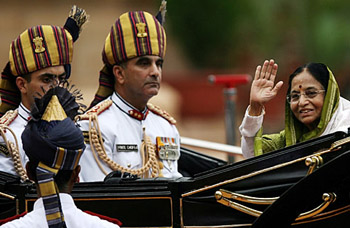| Home / International / International -- News | Tools: Save | Print | E-mail | Most Read |
| First Female President Takes Office |
| Adjust font size: |
India inaugurated its first female president yesterday, a move that has been touted as a boost for women in a country where they often face discrimination. Some women, however, dismissed Pratibha Patil's appointment as mere tokenism and challenged her to make good on pledges to address gender discrimination.
Patil's black limousine was escorted through the streets of New Delhi by a company of soldiers clad in white uniforms and riding horses and she took the oath of office in a packed Parliament. The ceremony was followed by a 21-gun salute that could be heard across central New Delhi. Patil, a 72-year-old former lawyer, legislator and governor of the northwestern state of Rajasthan, was chosen for the largely ceremonial post by the governing Congress party and elected by national and state lawmakers last Thursday. In her inaugural speech, Patil said that addressing discrimination against women would be one of her priorities. "Empowerment of women is particularly important to me as I believe this leads to the empowerment of the nation," Patil said, calling for universal education in India, where few girls are given access to schools. "We must banish malnutrition, social evils, infant mortality and female feticide," she added. Despite being touted as an important step for gender equality, Patil's election has elicited only a lukewarm welcome from other women, with many saying her lackluster political career and rocky road to the presidency have given them little more than symbol - and not a leader who represents them. Patil was hand-picked for the post of president by Sonia Gandhi, the head of the governing Congress party. While India has had several women in positions of power - most notably Gandhi and her mother-in-law, Indira Gandhi, who was elected prime minister in 1966 - women still face much discrimination. Daughters are often seen as a burden mostly because tradition requires that a bride's family pay the groom's family a large dowry of cash and gifts. Their education is often neglected, and many don't get adequate medical treatment when ill. Patil's victory, projected as a step forward for Indian women, didn't impress many analysts and ordinary Indians. "I feel that having a woman as the head of state is in some way reflective of how progressive a society is, but Pratibha Patil is not a right candidate," said Shradha Biyani, a marketing executive. But there are others who believe a woman occupying the 340-room colonial-era presidential palace will have an impact, even if it's only symbolic. |
| Tools: Save | Print | E-mail | Most Read |
 |
| Related Stories |
 |
 |
|
 |
| Links |
